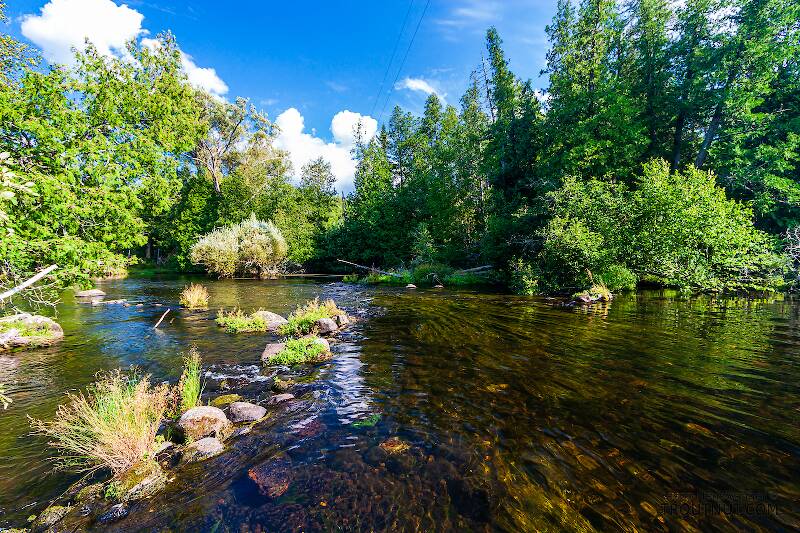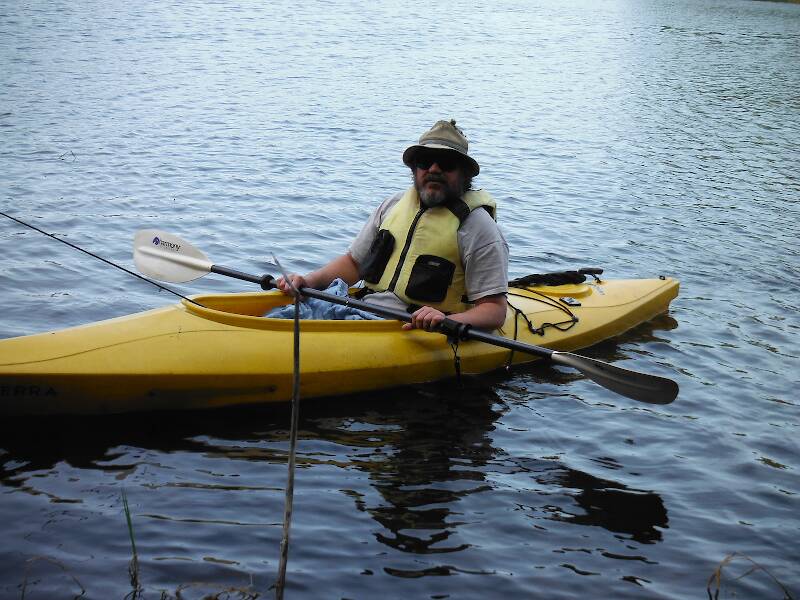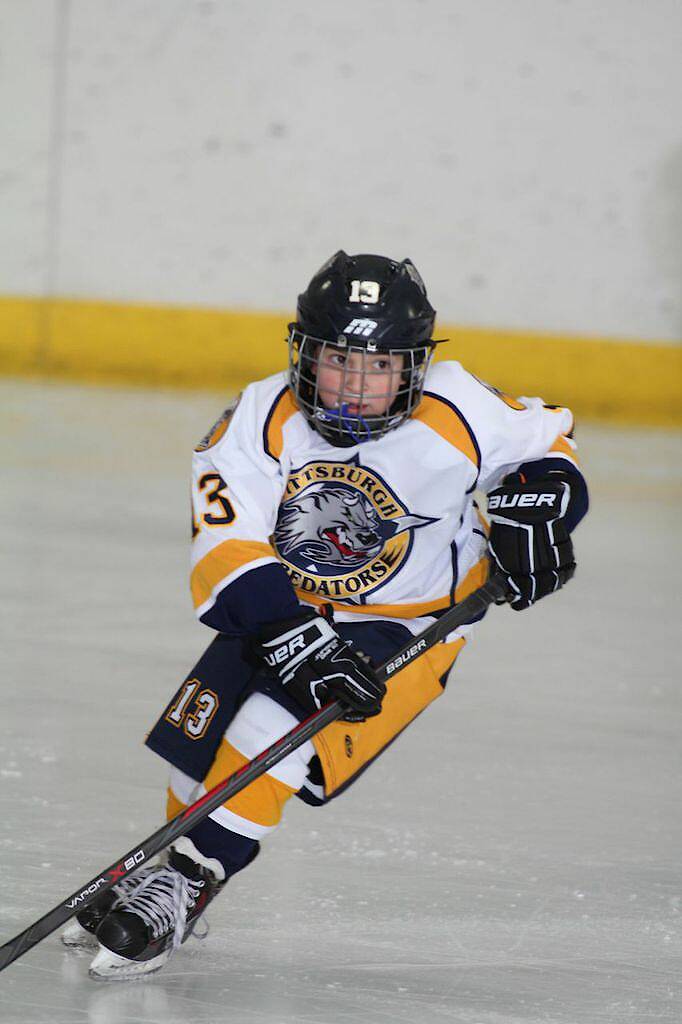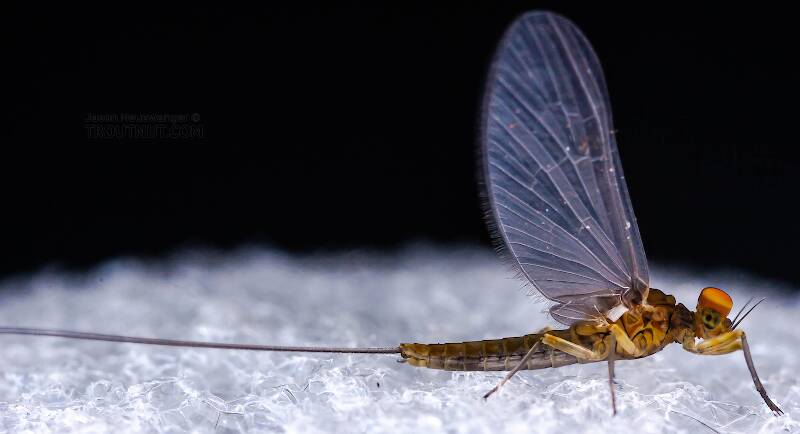
Blue-winged Olives
Baetis
Tiny Baetis mayflies are perhaps the most commonly encountered and imitated by anglers on all American trout streams due to their great abundance, widespread distribution, and trout-friendly emergence habits.
Featured on the forum
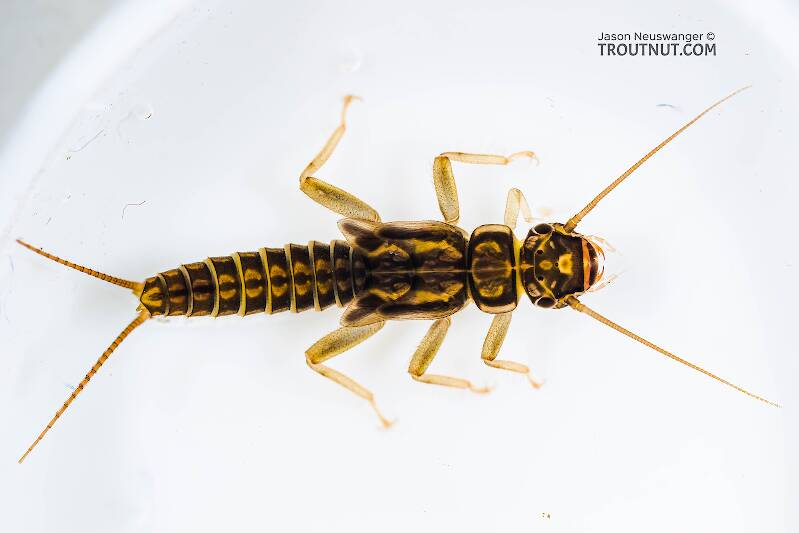

Troutnut is a project started in 2003 by salmonid ecologist Jason "Troutnut" Neuswanger to help anglers and
fly tyers unabashedly embrace the entomological side of the sport. Learn more about Troutnut or
support the project for an enhanced experience here.
Jmd123 on Oct 17, 2010October 17th, 2010, 4:12 pm EDT
Due to popular demand, I will now post a recipe and tying instructions for my Killer Bass Fly (KBF).
MATERIALS
Hook: standard 3x-long streamer hook (mustad 9672 or equivalent), size 2-10 (I've also tied some larger, size 10 is my favorite followed by size 6).
Thread: standard fly-tying thread, original silver-grey.
Tail: grizzly marabou, original in natural grey, topped by 10-15 strands of Krystal Flash, original in silver.
Body: Krystal Tinsel Chenille (original), or Sparkle Braid or braided Mylar tubing, original in silver.
Hackle: collar of natural grizzly (original).
Eyes: bead-chain, original in silver (dumbell eyes for deeper waters).
INSTRUCTIONS
Tail: tie in 3-4 grizzly marabou feathers at hook bend, length approximately 1 hook shank length beyond the bend (like a Woolly Bugger tail). Top with 10-15 strands of Krystal Flash.
Body: tie in about 6" (for size 10) of Krystal Tinsel Chenille at the hook bend and wind tightly to form a body to about 1/4" behind the hook eye, then tie off.
Collar: tie in a nice webby grizzly hackle feather at the front of the body, wind it to form a collar, then pull back toward hook bend with fingers and use thread to form a rear-facing cone.
Eyes: pair of bead-chain eyes tied in figure-eight style on top of the hook between the collar and the eye, whip-finish and secure with plenty of head cement.
This will give you a fly with lots of motion and flash, a barred/speckled appearance, with prominent eyes and a hook point that rides up.
VARIANTS
Tan grizzly marabou, gold Krystal Flash, gold Tinsel Chenille or Sparkle Braid, mottled tan hackle, and gold bead-chain eyes. Use tan thread for tying.
Brown grizzly marabou, copper Krystal Flash, copper Tinsel Chenille or Sparkle Braid, mottled brown hackle, and gold bead-chain eyes (haven't found copper bead-chain yet) - this variant makes a fine sculpin imitation that was grabbed by a 20"+ brown two summers ago on the Pigeon River (broke me off, sadly). Use brown thread for tying.
Natural grizzly marabou, rainbow Krystal Flash, rainbow Sparkle Braid, natural grizzly collar, silver bead-chain eyes (this may imitate a small bluegill). Use grey thread for tying.
Chartruese grizzly marabou, chartruese Krystal Flash, chartreuse Sparkle Braid, chartruese hackle, silver bead-chain eyes. Use chartruese thread for tying.
Chartruese grizzly marabou, silver Krystal Flash, silver Tinsel Chenille, chartruese hackle, silver bead chain eyes. Use chartruese thread for tying.
Natural grizzly marabou, pearlescent Krystal Flash, pearlescent Tinsel Chenille, natural grizzly collar, silver bead chain eyes. Use white thread for tying.
Olive grizzly marabou, peacock herl topping, peacock herl body, olive grizzly hackle, black bead chain eyes. Use olive thread for tying.
For deeper waters and fish, substitute weighted dumbell eyes for bead chain. My favorite dumbells are silver with red eyes, also gold with chartruese eyes or all-silver eyes (with black pupils).
Fish this fly with strips and jerks to imitate a crippled baitfish.
TIE 'EM UP AND GO FISH 'EM, GUYS!!!!
Jonathon
MATERIALS
Hook: standard 3x-long streamer hook (mustad 9672 or equivalent), size 2-10 (I've also tied some larger, size 10 is my favorite followed by size 6).
Thread: standard fly-tying thread, original silver-grey.
Tail: grizzly marabou, original in natural grey, topped by 10-15 strands of Krystal Flash, original in silver.
Body: Krystal Tinsel Chenille (original), or Sparkle Braid or braided Mylar tubing, original in silver.
Hackle: collar of natural grizzly (original).
Eyes: bead-chain, original in silver (dumbell eyes for deeper waters).
INSTRUCTIONS
Tail: tie in 3-4 grizzly marabou feathers at hook bend, length approximately 1 hook shank length beyond the bend (like a Woolly Bugger tail). Top with 10-15 strands of Krystal Flash.
Body: tie in about 6" (for size 10) of Krystal Tinsel Chenille at the hook bend and wind tightly to form a body to about 1/4" behind the hook eye, then tie off.
Collar: tie in a nice webby grizzly hackle feather at the front of the body, wind it to form a collar, then pull back toward hook bend with fingers and use thread to form a rear-facing cone.
Eyes: pair of bead-chain eyes tied in figure-eight style on top of the hook between the collar and the eye, whip-finish and secure with plenty of head cement.
This will give you a fly with lots of motion and flash, a barred/speckled appearance, with prominent eyes and a hook point that rides up.
VARIANTS
Tan grizzly marabou, gold Krystal Flash, gold Tinsel Chenille or Sparkle Braid, mottled tan hackle, and gold bead-chain eyes. Use tan thread for tying.
Brown grizzly marabou, copper Krystal Flash, copper Tinsel Chenille or Sparkle Braid, mottled brown hackle, and gold bead-chain eyes (haven't found copper bead-chain yet) - this variant makes a fine sculpin imitation that was grabbed by a 20"+ brown two summers ago on the Pigeon River (broke me off, sadly). Use brown thread for tying.
Natural grizzly marabou, rainbow Krystal Flash, rainbow Sparkle Braid, natural grizzly collar, silver bead-chain eyes (this may imitate a small bluegill). Use grey thread for tying.
Chartruese grizzly marabou, chartruese Krystal Flash, chartreuse Sparkle Braid, chartruese hackle, silver bead-chain eyes. Use chartruese thread for tying.
Chartruese grizzly marabou, silver Krystal Flash, silver Tinsel Chenille, chartruese hackle, silver bead chain eyes. Use chartruese thread for tying.
Natural grizzly marabou, pearlescent Krystal Flash, pearlescent Tinsel Chenille, natural grizzly collar, silver bead chain eyes. Use white thread for tying.
Olive grizzly marabou, peacock herl topping, peacock herl body, olive grizzly hackle, black bead chain eyes. Use olive thread for tying.
For deeper waters and fish, substitute weighted dumbell eyes for bead chain. My favorite dumbells are silver with red eyes, also gold with chartruese eyes or all-silver eyes (with black pupils).
Fish this fly with strips and jerks to imitate a crippled baitfish.
TIE 'EM UP AND GO FISH 'EM, GUYS!!!!
Jonathon
No matter how big the one you just caught is, there's always a bigger one out there somewhere...
Gutcutter on Oct 18, 2010October 18th, 2010, 12:23 am EDT
kinda something like this (minus the bead chain)
i remember seeing this in fly tyer a few years back, tied a bunch and used them with good success - with and without bead chain.
i can vouch for the pattern no matter who "invented" it
http://www.flytyer.com/index.php?option=com_content&task=view&id=2826&Itemid=82
gut
p.s.
i don't think you could cast them with the spinning rods shown in the background of the pictures posted in the other thread - unless of course the dumbells were made of heavy lead
i remember seeing this in fly tyer a few years back, tied a bunch and used them with good success - with and without bead chain.
i can vouch for the pattern no matter who "invented" it
http://www.flytyer.com/index.php?option=com_content&task=view&id=2826&Itemid=82
gut
p.s.
i don't think you could cast them with the spinning rods shown in the background of the pictures posted in the other thread - unless of course the dumbells were made of heavy lead
All men who fish may in turn be divided into two parts: those who fish for trout and those who don't. Trout fishermen are a race apart: they are a dedicated crew- indolent, improvident, and quietly mad.
-Robert Traver, Trout Madness
-Robert Traver, Trout Madness
Jmd123 on Oct 18, 2010October 18th, 2010, 7:28 am EDT
GC, that's not quite what I am talking about. For one thing, my KBF calls specifically for grizzly marabou in the tail. I strongly believe the barred effect provided by this material is one of the reasons this fly has been so effective for me. For another, I do not palmer the hackle over the body like a Woolly Bugger, but rather wrap it as a collar at the front and "cone" it back over the body, which leaves a slender body with a set of "fins" at the front of it, somewhat like a small sculpin or darter. Third, the bead-chain eyes are also essential to this fly, as they provide the only weight, and in fact the bead chain actually adds a small rattle to the fly (take a fly with bead chain, hold it up to your ear, and shake it - you'll hear what I'm talking about), much less cumbersome and clumsy that the (in my humble opinion) stupid-looking glass rattles out there on the market these days. Fourth, I don't think I've ever seen anyone (other than myself) tie a Woolly Bugger in silver and grey as I did with the original. As I said, I have never seen anyting else quite like it with this combination of materials tied in this fashion. Some out there may beg to differ, but what's in that picture is just a fancied-up Woolly Bugger, not a KBF.
That said, I have also created "hybrids" between this fly and the Woolly Bugger. Also, truth be known, I originally got the idea for this fly from an old steelhead pattern known as the Comet (go look it up), and began messing with different colors and materials way back in '92 while trying to come up with a baitfish imitation for white bass fishing in Missouri (which I actually never did do). However, the materials I use are totally different from the Comet with the exception of the hackle collar and the eyes.
When Bob Clouser first introduced his Deep Minnow almost two decades ago, a lot of (somewhat ignorant, I thought) people said, "Why, that's just a JIG!" Well, I dare you to go tell Bob that...And, try throwing some REAL jigs on your flyrod sometime! Just don't let them hit you in the back of the head...
Jonathon
That said, I have also created "hybrids" between this fly and the Woolly Bugger. Also, truth be known, I originally got the idea for this fly from an old steelhead pattern known as the Comet (go look it up), and began messing with different colors and materials way back in '92 while trying to come up with a baitfish imitation for white bass fishing in Missouri (which I actually never did do). However, the materials I use are totally different from the Comet with the exception of the hackle collar and the eyes.
When Bob Clouser first introduced his Deep Minnow almost two decades ago, a lot of (somewhat ignorant, I thought) people said, "Why, that's just a JIG!" Well, I dare you to go tell Bob that...And, try throwing some REAL jigs on your flyrod sometime! Just don't let them hit you in the back of the head...
Jonathon
No matter how big the one you just caught is, there's always a bigger one out there somewhere...
Quick Reply
Related Discussions
Topic
Replies
Last Reply

